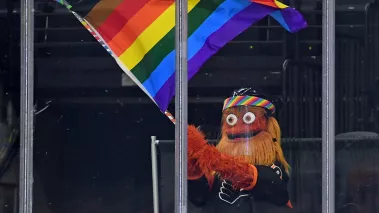Table of Contents
Russian censorship laws should not dictate expression in the NHL

Eric Hartline / USA TODAY Sports
Philadelphia Flyers mascot Gritty waves a flag during Pride Night against the Pittsburgh Penguins at the Wells Fargo Center in 2021.
American sports leagues are no strangers to disputes over how teams, players, and upper level management can express themselves, whether those fights center on NFL players’ decision to protest during the national anthem or an NBA executive’s tweet expressing support for human rights in Hong Kong.
Now the NHL finds itself in the crosshairs of the latest free speech fight: How should it handle team-run Pride nights when five percent of its players hail from a country that aggressively criminalizes so-called “propaganda” about LGBTQ rights and communities?
It’s a challenge facing teams across the league as they’re forced to weigh their intention to engage in certain forms of expression — specifically having players wear Pride-themed jerseys during on-ice warm ups — against valid fears that players and their families could face repercussions within Russia for partaking in Pride nights in the United States.
The NHL’s Russian players have legitimate reason to be concerned, and this is not the first time the league has tangled with Russian politics. Two years ago, the New York Rangers stood by player Artemi Panarin after allegations surfaced that he assaulted a woman 10 years earlier. Team leaders claimed the accusations were false, and were in fact a retaliatory measure to punish Panarin for his open support of imprisoned Russian opposition figure Alexei Navalny. Decades earlier, Alexander Mogilny made the dangerous decision to defect from the Soviet Union to the United States, the first player to do so, where he joined the Buffalo Sabres. Mogilny feared for his family, and later faced extortion threats.
Teams should not allow Russian law to determine how their organizations acknowledge Pride or any other movement.
In recent years, Russia has amped up its censorship and persecution of perceived LGBTQ activism, detaining advocates and banning books, film, and art with similar themes.
In response, teams — including the Minnesota Wild, the New York Rangers, and most recently the Chicago Blackhawks — have made the wrong calculations and decided to entirely abandon Pride warm-up jerseys from their programming out of fear of retaliation against their Russian players.
The long reach of authoritarian regimes
FIRE has long expressed concerns about the role foreign governments play in changing the parameters of free expression in the United States, frequently warning colleges that the Chinese government cannot be allowed to dictate what is said on the quad and in the classroom. Institutional self-censorship is not the way to protect foreign nationals at greater risk due to oppressive laws, nor is it a solution American organizations should look to as an easy-out when faced with complex cross-border free speech controversies.
The same principles apply here: Teams should not allow Russian law to determine how their organizations acknowledge Pride or any other movement.

George Washington University recants promise to uncover Chinese government critics after artist’s satirical Olympics posters appear on campus
Instead, players should be free to choose, as their consciences or personal circumstances dictate, whether they partake in team expressive activities.
Russian NHL players are not a monolith. And while they face different legal concerns than many of their teammates, they are not playing hockey in Russia. They are playing hockey in Canada and the United States, where Russian laws do not apply. They should be allowed the choice to take part in Pride night — and some have decided to do so, like the Pittsburgh Penguins’ Evgeni Malkin or the San Jose Sharks’ Alexander Barabanov and Nikolai Knyzhov.
That’s what makes free expression meaningful in the first place: the ability to decide for oneself which values to espouse and which to reject, rather than having others choose for us.
Vladimir Putin and the Russian government should not make that choice for Russian players — or their non-Russian peers — in free countries.
How the NHL can protect all players’ expression
Teams now weighing whether to allow foreign law to dictate organizational expression and decision making should look at how others, like the Philadelphia Flyers, handled this issue. In January, player Ivan Provorov abstained from wearing a Pride warm up jersey, citing his Russian Orthodox faith. Provorov is Russian, but it’s unclear if he maintained concerns about violating Russia’s laws governing pro-LGBTQ expression as well as his personal religious tenets.
Though it won’t come without controversy, as the Flyers can attest, this is the best path to navigate these challenges in a free, pluralistic society where players will have a multitude of reasons — from personal belief to foreign legal repercussions — for wanting to speak or to stay silent.
Though Provorov did not join his teammates in skating in Pride jerseys, the rest of the Flyers team chose to partake. And that was the right outcome: Provorov chose for himself. Russian law didn’t choose for his teammates.
Recent Articles
FIRE’s award-winning Newsdesk covers the free speech news you need to stay informed.

Harvard stands firm, rejects Trump administration’s unconstitutional demands

FIRE comment to FCC calls for review of regulations that may violate the First Amendment

FIRE statement on immigration judge’s ruling that deportation of Mahmoud Khalil can proceed


